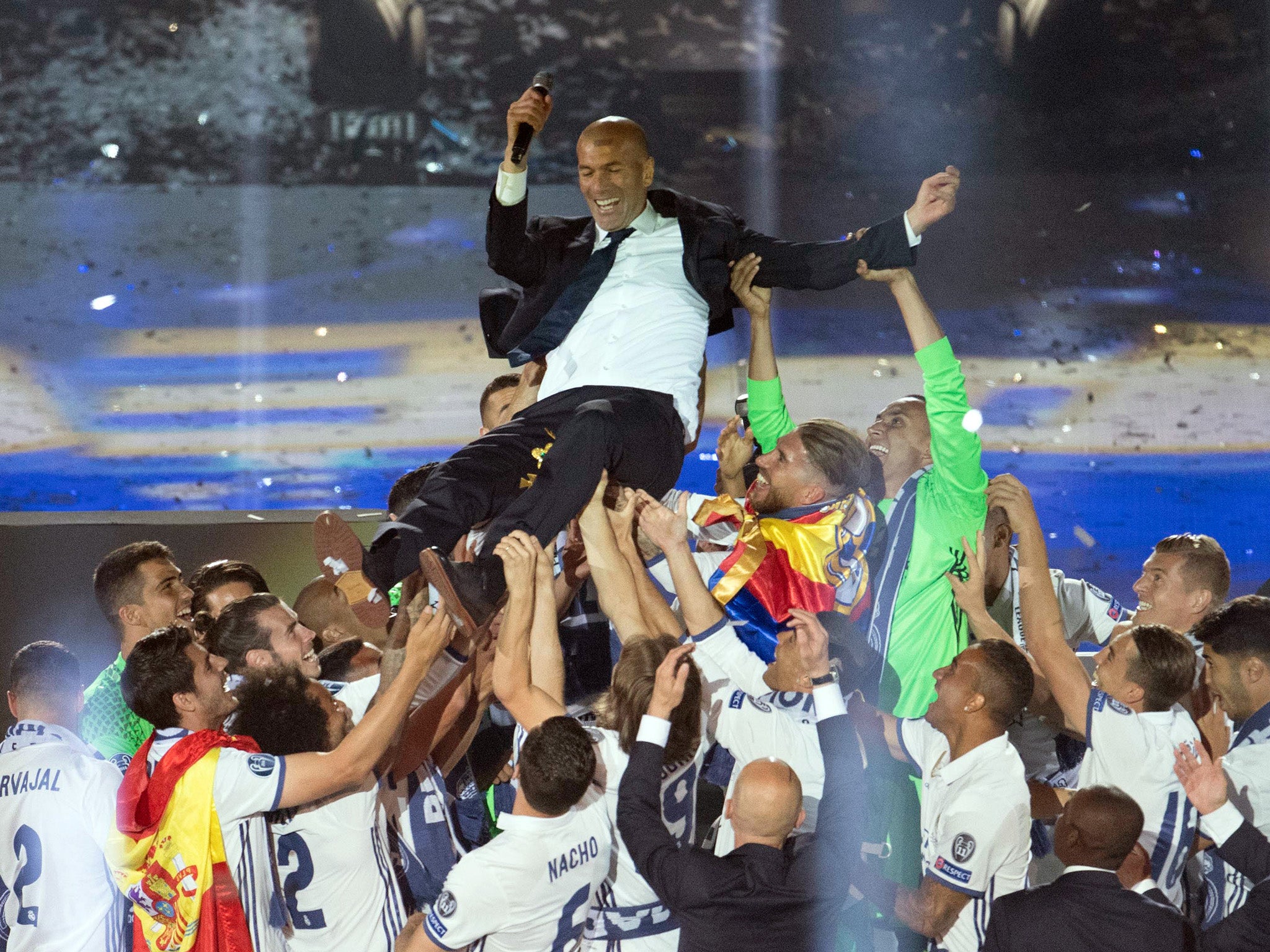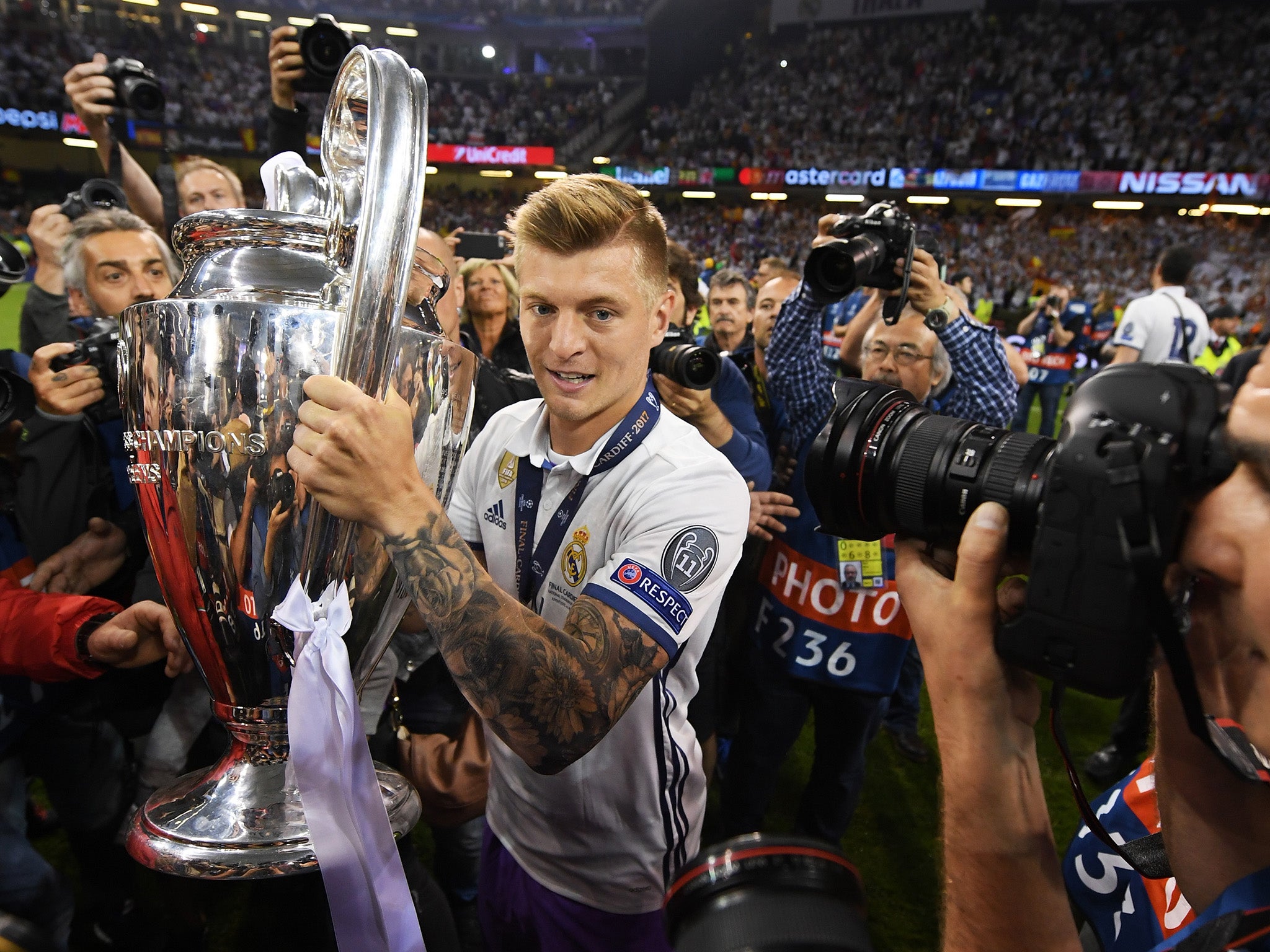Real Madrid's back-to-back Champions League triumph fails to carry lessons of previous European winners
Luka Modric and Toni Kroos are the only obvious difference between them and Barcelona

At half-time in the Principality Stadium dressing room, the Real Madrid players were frustrated, and feeling a bit of pressure.
Juventus had probably been the better team in the opening period of the Champions League final, and at 1-1 had been putting Zinedine Zidane’s side under a lot more pressure. So, the French manager gave Real rather elementary instructions to prove they were probably the much better team in general.
Zidane told them to use that frustration, to get on the ball more and deny it from Juve, and to aggressively play much higher up the pitch. It worked resoundingly.
“We were clearly superior in the second half, and we won the game physically and with a certain determination,” the Real boss said. “Everyone in the squad has felt important, they get along together well. They have connection and when you achieve things it is easier, but it is a lot of work. But, above all, the key is that all players get annoyed. It is a key component in success.”
And that was it. That rather uncomplicated massaging of emotions was the key to a success that has proved impossible for every other great team over the last 27 years, as Real became the first in that time to finally retain the grand trophy, and the ninth to do so in just over six decades of the great competition.
Joining that elite group in raising the European Cup for a second successive season also raises a searching question and discussion, however, especially in light of Zidane’s words. Because, with each of those prestigious predecessors and pretty much any side that achieves something historically significant, their legacy usually goes beyond the trophies won. It is that the landmark nature of their achievement also leaves a mark on the game. The very fact they have done something so special naturally leads to a fascination with what they have specifically done to get there; whether there is any lesson that can be learned. These sides don’t just dominate the game, after all, but influence it.
Look through those predecessors. The first team to retain it and first great Real Madrid and European Cup side from 1955-60 were pioneers who influenced the entirety of modern football and seemed to open up a wider new world, before Benfica 1960-62 honed the Spanish attacking game and brought it on. Internazionale 1963-65 then introduced Catenaccio - and, really, the first truly defensive style of play - to that new world, before Ajax 1970-73 totally changed football with Total Football, effectively deepening the intelligence and sophistication of the game and introducing the whole idea of a philosophy to the sport for the first time. Bayern Munich 1973-76 were then defined by a core of winners who carried through a standard, Liverpool 1976-84 by a team collective who carried through a set of standards, and Nottingham Forest 1978-80 by a genius manager, before Arrigo Sacchi’s AC Milan 1988-90 evolved Ajax’s Total Football and further changed football.
So what is it with Real? What are they defined by? What is the lesson of their victory? What are the marks of their landmark win? What new idea is being vindicated here?
Well, going by what we know from the team and Zidane’s very comments, the lesson might be that there is no lesson… other than Real just more emphatically proving what we already know, and that finance and size remain the most important factors in football. This is not to do down grand football philosophies or idea, since they are what truly maximises teams and finances, but if you have enough money you have a good chance of overcoming almost anything.
Get 4 months free with ExpressVPN
Servers in 105 Countries
Superior Speeds
Works on all your devices
ADVERTISEMENT. If you sign up to this service we will earn commission. This revenue helps to fund journalism across The Independent.
Get 4 months free with ExpressVPN
Servers in 105 Countries
Superior Speeds
Works on all your devices
ADVERTISEMENT. If you sign up to this service we will earn commission. This revenue helps to fund journalism across The Independent.
This is by no means to disparage their achievement, either. This Real side are clearly a great team, who play great and joyous football, but are also the consequence of great expenditure and pure football clout to attract the best players and create the best squad.
There is no critical idea to what they do, but they do just have a critical mass of his quality players, who will guarantee a certain quality of football.
From there, there is also no big explanation for their success, but instead a lot of little tweaks and messages that added up to something great. The first was perhaps the introduction of Isco to the first XI, since his obvious suitability to the attack transformed them from a fairly unconvincing collection of individual into a cohesive and flowing collective. Zidane then used his personality to convince Cristiano Ronaldo to rest more so he could do what he did in Cardiff, and his inherent knowledge of the game to offer the half-time suggestions he did and - as the Portuguese said - “transmit his belief”.

It then greatly helps if you have a squad great enough to leave a world-record signing like Gareth Bale on the bench, a World Cup top scorer like James Rodriguez on the bench, not to mention have a midfield of Toni Kroos and Luka Modric on the pitch.
Even if a club doesn’t have an overarching football philosophy or tactical identity, these are two players of such sophistication and control that together they can’t help but instil a team with a structure; with a greater intelligence.
Little wonder that Zidane mostly just tells the duo to “express” themselves, as Modric revealed to the Independent in the Principality Stadium mixed zone.
“He tells us what we need to do in defensive part, and in the game just to express ourselves, to keep the ball, to play for the team and to try to do our best,” the Croatian said when asked what instructions he and Kroos are given. “If he can see something that we can do on the pitch, he tells us, and we are trying to do in our best way.”
And what a way it is. The duo can actually be pinpointed as the primary difference now between Real and the last other Champions League winners, their great rivals, Barcelona. While the Catalans have astonishingly neglected their midfield since the departure of Xavi, Real have bolstered it to the max. Most elite sides - even Barcelona - could just do with one of Modric and Kroos, let alone both.
The way that Zidane speaks to them in general and spoke to the squad at half-time is also reminiscent of Franz Beckenbauer’s comments about that Bayern Munich side of the 70s, that the team was so good that they really just needed “a psychologist” and someone who knew the mood rather than a manager. Again, that’s not to disparage Zidane, but that’s what it is. That's what they are.
You obviously need more than a top team in the modern age, and really need a top squad, but Real have exactly that - just so many good players.
Sometimes it is as simple as that, even for a feat that had been so difficult. Their win is something of a throwback in some ways, but also entirely reflective of the modern era.
One of the main reasons that the Champions League had not been retained in the last 27 years was because the competition had become a core of massive super-clubs crashing against each other, so it is no coincidence that the biggest of all just ended up standing their ground and standing taller.
There’s no real lesson. There’s just Real Madrid, maximising all of their immense football clout, for an achievement of immense football importance.
Join our commenting forum
Join thought-provoking conversations, follow other Independent readers and see their replies
Comments